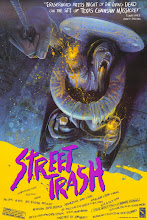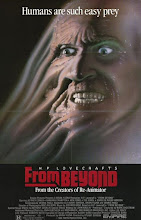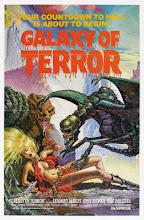
"I'm the watchman of the Buffalora Cemetery. I don't know how the epidemic started. All I know is that some people, on the seventh night after their death, come back to life. I call them Returners, but frankly I can't understand why they're so anxious to return. The only way to get rid of them once and for all is to split their heads open. A spade'll do it, but a dum-dum bullet is best. Is this the beginning of an invasion? Does it happen in all cemeteries? Or is Buffalora just an exception? Who knows? And in the end, who cares? I'm just doing my job."
So says Francesco Dellamorte. However, it appears that he may be the one doing the Returning now, in a Michele Soavi written and directed sequel to his Dellamorte Dellamore, considered by many to be the last truly great Italian horror film (although I recently loved Federico Zampaglione's Shadow - more on that soon!). Fangoria is reporting that whilst conducting a recent interview with Dario Argento, Luigi Cozzi dropped this juicy bit of news:
“Michele has told me that he has started to write the script for a special horror project he plans to shoot between the end of 2011 and the beginning of 2012: a sequel to his Gothic masterpiece Dellamorte Dellamore. He’s going to produce it himself and wants it to really be a great, strong, shocking Italian horror movie.”

Soavi has been conspicuously absent from the horror scene since his '94 masterpiece blew minds, although a couple of years ago he did tease a return to the genre with a project called Catacombs Club (which now seems to have evaporated into the celluloid ether).
 Several years ago I caught a screening of his 2006 crime thriller Arrivederci Amore, Ciao (right) at a local Italian film fest, and although the story didn't make much of an impression on me, as a visual stylist it showed Soavi still very much at the top of his game. Years later, after only one viewing I still have some vivid images from that film indelibly printed on my psyche: an atmospheric monsoonal jungle - neon-lit noirish bars - a starkly cold hallway. He even had regular collaborator Sergio Stivaletti on hand to provide some animatronic FX, so it was obvious that his years of hiatus and as a TV director hadn't taken him too far from his roots.
Several years ago I caught a screening of his 2006 crime thriller Arrivederci Amore, Ciao (right) at a local Italian film fest, and although the story didn't make much of an impression on me, as a visual stylist it showed Soavi still very much at the top of his game. Years later, after only one viewing I still have some vivid images from that film indelibly printed on my psyche: an atmospheric monsoonal jungle - neon-lit noirish bars - a starkly cold hallway. He even had regular collaborator Sergio Stivaletti on hand to provide some animatronic FX, so it was obvious that his years of hiatus and as a TV director hadn't taken him too far from his roots.It's curious that this should eventuate now, what with the other adaptation of Tiziano Sclavi's Dylan Dog comics - Dylan Dog: Dead of Night - just doing the rounds recently. That one stars Brandon Routh as the titular detective, but I'd love to see Rupert Everett and François Hadji-Lazaro reprise their roles in this.
Perhaps listening to Manuel De Sica's score for Dellamorte will help you to ponder some of life's deepest philosophical questions: is there any real point to all this living, loving and dying? Is our perceived universe even real? Past this tunnel is the rest of the world...


















_poster.jpg)


































































